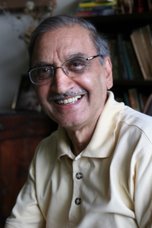Prince, Poet, Lover, Builder
By Narendra Luther
We have dealt with the plebian poets of Golconda. Now it is time to meet a royal bard. The founder of Hyderabad, Mohammed Quli Qutb Shah( b.1565; d.1611) was a prince, poet, lover, and a builder.
Mohammed Quli was a prolific and a versatile poet. He wrote nearly 1,00,000 lines of poetry in Persian, and in every genre of what was later to be called Urdu.
Secular Element
Before him Dakhni poetry had been largely religious. Quli introduced the secular element into it. He talks of nature in its variegated aspects, seasons of the year, flowers, fruits, vegetables, gardens, social life, customs, and festivals. He sings of the pleasures of physical love with a rare candour and abandon. For him there is no difference between a Hindu and a Muslim:
Kufar reet kya hor Islam reet
Har ek reet mein hai ishq ka raaz
(What is the heathen’s creed -- and the Muslim’s.
Every practice is based on the secret of love.)
Further:
Main na janun Kaba o but khana o maikhana koon
Dektha hoon par kahan diktha hai tuj mukh ka safa
(I don’t know the holy Kaaba, the idol’s temple or the tavern,
I look everywhere but can’t see a face as clear as yours)
On love he has some observations of universal truth:
Suno log meri prem kahani
Keh peela hai rang ashiqui ki nishani
(Listen folks to my tale of love,
A palate complexion signifies a lover).
Figures of Speech
Quli often employs the devices of alliteration and onomatopoeia very effectively. Note the following:
Piya soon rat jagi hai so dikthi hai sudhan sarkhush
Madan sarkhush, sayan sarkhush, anjan sarkhush nayan sarkhush
(Oh lady, you have kept the whole night awake with your lover.
Cupid is happy, so are the couch, the collyrium - and your eyes)
Dan dana garja joban badal niman
Kangana jhalkar minj sunao tum
(Youth thunders like a cloud.
Let’s hear the jingle of bangles).
Unfortunately, the rhythm and internal rhyme abounding in his poetry can’t be put across in translation adequately.
Hindi element
Quli had a sound and extensive knowledge of the Hindi ragas. He mentions Asavari, Dhanashree, Gauri, Malahar, Kalyan, Basant and Ramkali in his poems. He declares his preference for music in the following couplet:
Mere sang mil bajaati sankh gaati, Sankhara abhran
Sriraga jo gati istri to mujko bhati hai
(She who plays the conch with me and sings Snakhrabhram,
The one who sings Sriraga -- that woman I like).
Quli’s choice of subjects was unlimited. The entire range of life in its variations was covered by him. His idiom sprang from the soil and his language was the one spoken by the common people in their daily lives. He has been compared to Nazeer Akbar Abadi of Agra (1740-1830) as a people’s poet. But Nazeer was a plebian, whereas Quli was a ruler.
His range
Quli is a poet of sight and sound, of relish and savour, of fragrance and redolence, of spice and flavour, of sunrise and daylight, of rhyme and rhythm, of dance and music – of the celebration of life. His poetry glorifies all phases of biological existence. He rejoices in seasons of the year, the rhythmic succession of which makes the sum of our life-spring, monsoon, winter, summer. He celebrates festivals, birthdays, weddings, New Year Days. On each topic, there is not one poem, but many. As life’s cycle goes on, he reverts to each of these recurring events with renewed vigour. He doesn’t get bored with life, because every aspect of it excites him. There is no pessimism or cynicism in him. He is an extrovert whose reaction to events is always positive. He gloats on being the favourite ‘servant’ of the Prophet and the Imams, which made him a favourite of Fate. He glories in being a ruler and living a life ease and sensuality. A pure sense of life pulsates through his writings.
A Misconception
Some people say that Mohammed Quli was also a poet in Telugu. No such claim has been substantiated. I have been able to find only three words of Telugu in his entire anthology – ‘Em Mari em’.
His invocation at the inauguration of the new city of Bhagnagar, has become famous:
Mera sheahar logan soon mamoor kar
Rakhya joon tun darya mein min Ya Sami
(O God, fill my city with people, as you have the river with fish)
Obviously this prayer was heard and the city now suffers from over- population. It has one of the highest rates of growth in the country!
For his legendary love for Bhagmati, and his rich and enchanting poetry, Mohammed Quli has won a permanent place in the hearts of the people of the city. An annual festival is held to commemorate him. Generations of singers have sung his poems. Amongst them the most popular is:
Piya baj pyala piya jai na; piya baj ik til jiya jai na
Kate hain piya bin saburi karo; kaha jai amma kiya jai na
Nahi ishq jis woh bada koodh hai; kadi us say mil baisa jai na
Qutb Shah na do mujh divane ko pand; diwane ko kuch pand diya jai na
(Without the lover one cannot drink the cup!
Without him one cannot live for a moment.
They counsel patience in the absence of love.
Ah! It is easier said than done.
One unacquainted with love is a half-wit!
Don’t ever have anything to do with him.
Don’t give me any advice to a lunatic like me
You can’t din sense into an insane person).
Mohammed Quli is regarded as the first Urdu poet with an anthology to his credit. Dr.Zore edited his anthology for the first time in 1940. Professor Syeda Jaffar brought out a more extensive volume in 1985.
Mohd. Quli’s three successors were also poets. We will meet them next time.
***
Archived by www.mygoldencopy.com

No comments:
Post a Comment